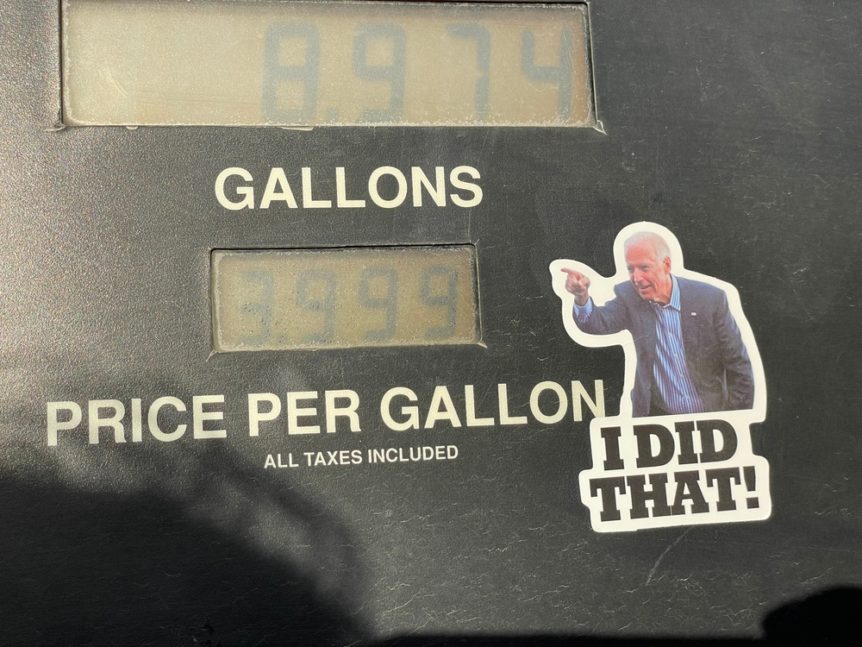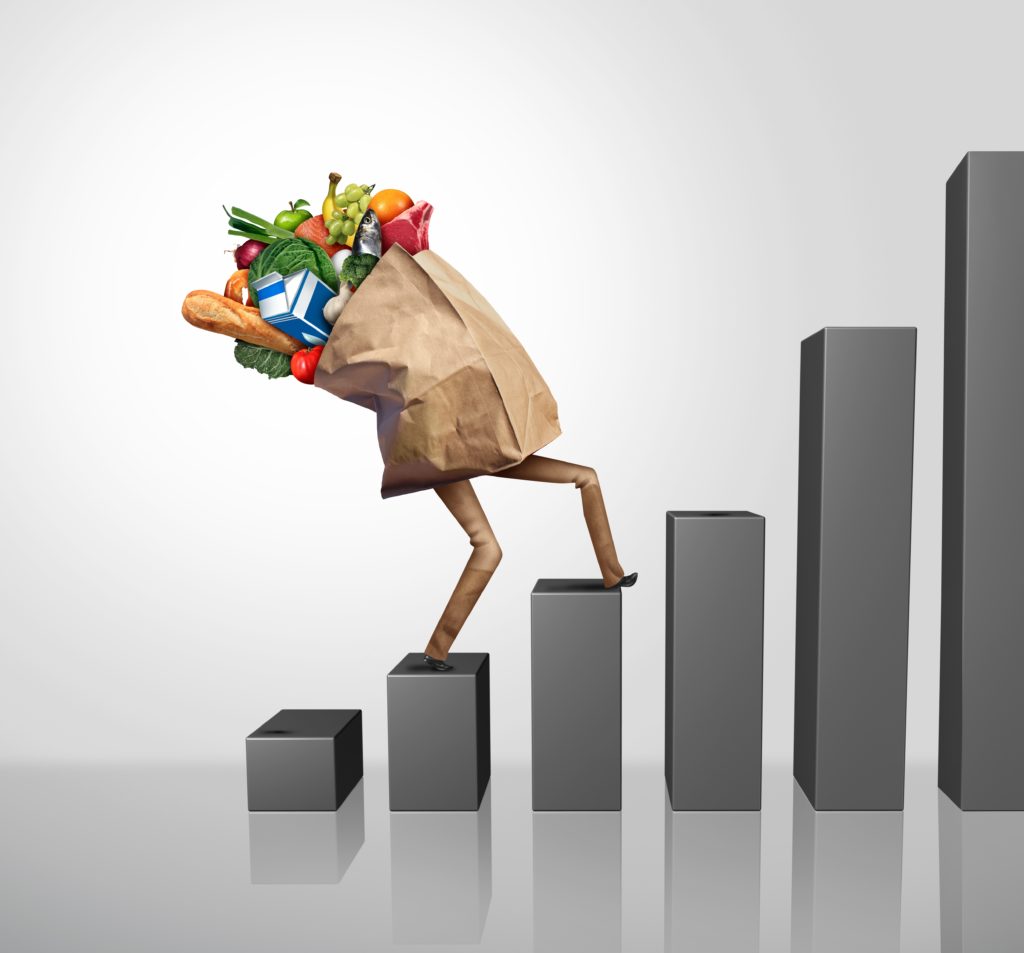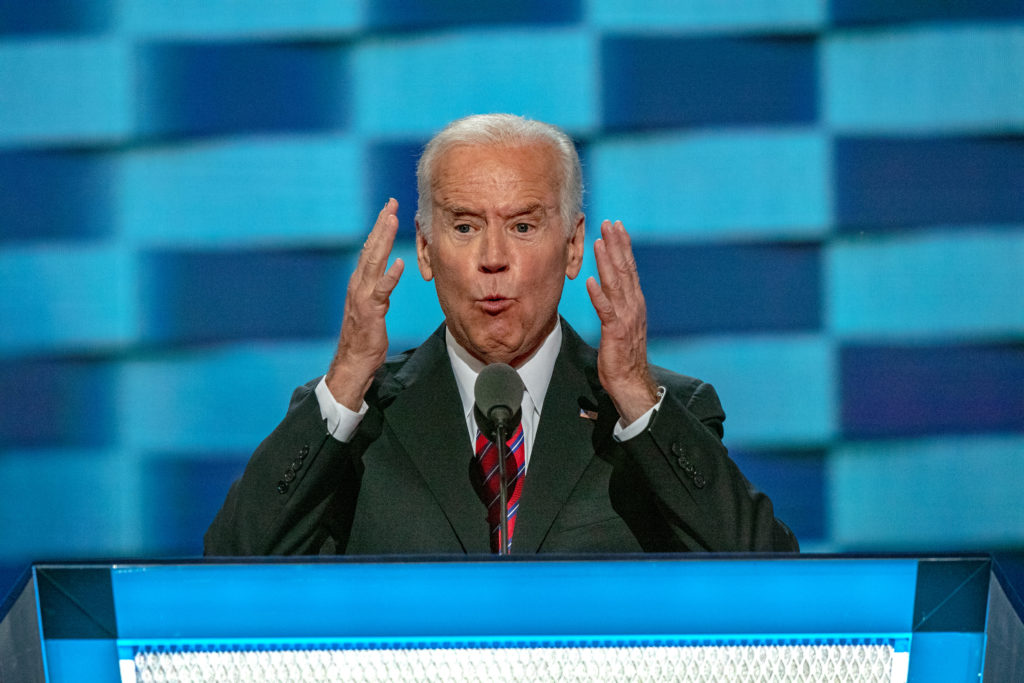
America Suffering From Joe Biden Gas Pain
By Steve Huntley
June 3, 2022
Every time you drive up to the gasoline pump you can’t help but notice that the price keeps inching up. All those inches have quickly added up to something very big and quite painful.
Since Joe Biden was elected president, the cost of gas has more than doubled.
Yes, more than doubled. As in increased by more than 100 percent since election day 2020. As in the cost to refill your auto’s tank now is more than twice what it was then. As in you can cut your latest fill-up tab in half and your bill is still more than it was in November two years ago.
Do the numbers yourself: The per-gallon cost of regular gasoline in Chicago was $2.237 in early November 2020 compared to $5.264 in late May 2022, according to the U.S. Energy Information Administration.
And agony at the gas station is only the most visible symptom of the great inflation plaguing the country today. Food prices are up nearly 11 percent over a year ago.
Welcome to Joe Biden’s build back better America.
Now Biden likes to claim that the gas pump misery is all Russian President Vladimir Putin’s fault for disrupting the international oil trade with his invasion of Ukraine — one of the few pronouncements from the babbler-in-chief that doesn’t inspire a cadre of panicked administration officials to emerge from the bowels of Washington to explain what he really meant.
There is an element of truth in Biden’s claim. Oil markets respond with price increases to international instability and the potential disruption of oil supplies.
The European Union, as part of sanctions against Putin, has declared it plans to ban all purchases of Russian oil — but not until the end of the year. Meanwhile, Russia has almost doubled its monthly earnings from selling oil and gas to EU nations, the BBC reported recently. So, Putin’s oil and gas are still sloshing through the market.
What Biden doesn’t want to talk about is that the underlying reason for your paying more for gas is domestic politics.
Liberal politicians never seem to understand that markets respond to signals from government. As president, Donald Trump approved the Keystone pipeline, reduced regulations on fossil fuel production, opened up federal lands for oil leases and, in so many words, urged petroleum companies to drill, baby drill. Production soared, and prices stayed at low levels even as energy demand surged during a booming economy before the Covid 19 pandemic hit.
Enter campaign 2020 and Biden campaigning to fight global climate change. His electioneering rhetoric made clear his energy goal: “I guarantee you, we are going to end fossil fuel.”
Elected president, he canceled the Keystone pipeline, stopped new petroleum leases on federal properties, added regulations to hamper the industry and promised “to identify steps through which the United States can promote ending international financing of carbon-intensive fossil fuel-based energy.”
Gasoline prices started heading north and haven’t stopped climbing.
Welcome to Biden’s build back better America.
When Americans howled about gas prices, Biden responded by calling for increased oil production — by Saudi Arabia and other OPEC countries. No signal to unleash the full potential of the American oil enterprise. And, it turned out, no increase in production from Saudi Arabia as its rulers turned a deaf ear to Biden. They like bigger profits.
What nobody in the Biden administration wants to say out loud is that high pump prices promote the environmental lobby’s green agenda. Well, that is nobody but Biden himself. In response to a reporter’s question about high gas prices and soaring inflation, Biden, probably unintentionally, let the cat out of the bag:
“Here’s the situation. And when it comes to the gas prices, we’re going through an incredible transition that is taking place that, God willing, when it’s over, we’ll be stronger and the world will be stronger and less reliant on fossil fuels when this is over.”
Today’s gas prices are at sky-high levels that a couple of years ago the Sierra Club and others climate alarmists could only dream of in their wildest fantasies. They aren’t crowing about fill-’er-up bills of $50 and more only because they know drivers, aka voters, are burning angry already.
Welcome to Biden’s build back better America.
Not far behind on the average American’s outrage meter is the checkout receipt at the supermarket. The tab for a shopping cart full of groceries is running 10.8 percent over a year ago. That’s the biggest one-year leap in the cost of putting food on the dinner table since the days when TV fans were wondering “who shot J.R.” on the prime-time soap opera “Dallas.” That’s 1980 for you too young to recall that pop cultural landmark.
And prices for meats, poultry, fish and eggs are up 14.3 percent, according to the Bureau of Labor Statistics. How long before Biden babbles, Let them eat cake? Just kidding.

Once again, Biden will claim the war in Ukraine is at fault. Russia and Ukraine account for more than a quarter of the international trade in wheat and barley, and the fighting is disrupting that trade. But of course, America’s farmers grow plenty of grain for our kitchens and restaurants, though shortages overseas will make exporting farm goods attractive and push up prices.
More important than the Ukraine war in pushing food prices higher are … rising energy costs.
Fossil fuel products are key ingredients of the fertilizers needed to grow crops. Farmers don’t use horses anymore but rely on petroleum fuels to power tractors, plows, combines and other agricultural implements that sow, cultivate and harvest grains, vegetables and fruits. Grain, vegetable and meat processors require energy. Trucks and trains powered by diesel and other oil-based fuels bring those foodstuffs to our supermarkets.
Every oil price increase reverberates through the food production system, with the increased costs in the end coming out of your pockets.
Welcome to Biden’s build back better America.
Inflation remains a home-grown problem. The tidal wave in government spending inspired by the Covid-19 pandemic flooded the economy with dollars. That started on Trump’s watch, but Biden came to office pushing ever more extravagant handout legislation despite warnings from even liberal economists like Lawrence Summers, a treasury secretary for President Clinton, that all that government cash was fueling inflation.
Biden wanted to pour even more gasoline on the inflation fire with his multi-trillion-dollar Build Back Better bill. And that failed only because one of the last traditional moderate Democrats in the Senate, Joe Manchin of West Virginia, saw the economic wildfire, heard the cries of pain from his constituents, was having no part of his party’s pyromania and withheld his critical vote in the 50-50 Senate.
Biden took to the pages of the Wall Street Journal with an op-ed about how he will tackle inflation. It was heavy on shaky claims of economic achievements, a pledge to reduce the federal deficit, a rerun of old promises to fix supply lines and infrastructure, lower prescription drugs costs, boost child and elder care — in other words prescriptions for more government spending and control of the economy. On energy, there was only bragging about releases from the strategic oil reserve and another call for Congress to act on his green energy agenda — but no appeal or policies for more U.S. oil production.
Welcome to Biden’s build back better America.
Also playing with matches in Washington was the Federal Reserve, which kept interest rates too low for too long, and printed dollars like they were Monopoly money.
The Fed is the one outfit Biden doesn’t blame for his inflation problem. When he’s not pointing his finger at Putin, he likes to complain about oil companies and meat processors making too much money or about supply chain disruptions or about Republicans not supporting his agenda. An NBC News report tells of a White House in disarray, Biden blaming his staff, complaining about them correcting his public statements, confronting angry Democrat donors. A White House staff shakeup seems likely as well as more bad mouthing of Republicans or “ultra MAGA” as he puts it.
Polling shows Americans aren’t buying his blame game.
They have to deal with reality. Rising gasoline and food prices combined with increased costs for other goods have the latest general inflation reading at 8.3 percent. If that keeps up, the $100 in your wallet today will have buying power of just over $90 next year.
And the statistics show salary increases aren’t keeping up with rising prices. And get this, the below-inflation salary hikes are still enough to push some Americans into higher tax brackets. Government profits from inflation.
Like a lot of Americans, my wife and I are planning our errands carefully to reduce our driving time. Across America, supper is starting to mean a smaller cut of meat or a cheaper quality product in some homes. Some Americans are shifting shopping to discount outlets like The Dollar Store. There’s evidence they’re starting to dip into savings to fund higher spending.
Homeowners seeing the value of their houses head up have to balance joy over the prospect of a sale one day in the future against the more immediate increase in property taxes coming even as other costs rise.
The stock market is a chaotic mess with the trading trend headed south, generating anxiety for Americans about their 401k retirement accounts.
Treasury Secretary Janet Yellen now says she “was wrong” when she said last year there was only a “small risk” from inflation, offering the excuse that there have been “unanticipated and large shocks to the economy.”
Unanticipated?
Not by Summers and others, mainly conservatives and Republicans, and just about anyone with economic sense, who warned that that Biden’s big spending posed a threat to the economy.
Given the magnitude of Yellen’s failure to, in her words, “fully understand” what was happening in the economy, why should Americans trust her economic advice now? Why shouldn’t she resign?
So, Biden and his economic advisers are no longer talking about inflation being transitory or predicting an end to it soon. The Fed is pushing up interest rates and trying to do it judiciously, so it doesn’t push the economy into recession.
As bad as things are, could they get worse?

What are the prospects for an economic downturn coupled with continued high inflation? That’s a formula for another bout of the stagflation that crushed family finances starting in the 1970s. By 1980, inflation approached 14.5 percent while unemployment exceeded 7.5 percent and the misery index was off the charts. Those of us alive then recall double digit interest rates making homes unsaleable and mortgages unaffordable.
Or what happens if the European Union delivers on its promise to reduce and/or end Russian oil imports? Will the resulting surge in demand for non-Russian petroleum — and no Biden encouragement for more American drilling — send prices even higher? If so, today’s $5 a gallon gasoline might look like a bargain.
Only one thing seems clear:
The “incredible transition” Biden bragged about portends more anxiety, distress and hardship for American families who have already seen too much of all three.
-30-
 Steve Huntley is a retired Chicago journalist living in Austin, Texas, who spent most of his career, almost three decades, with the Chicago Sun-Times, where he was a feature writer, metro reporter, night city editor, metropolitan editor, editorial page editor and a columnist for the opinion pages. Before that he was a reporter and editor with United Press International (UPI) in the South and Chicago, and Chicago bureau chief and a senior editor in Washington with U.S. News & World Report. Northwestern University Press has issued soft cover and eBook editions of Knocking Down Barriers: My Fight for Black America by Truman K. Gibson Jr. with Steve Huntley, a memoir of a Chicagoan who was a member of President Roosevelt’s World War II Black Cabinet working to desegregate the military.
Steve Huntley is a retired Chicago journalist living in Austin, Texas, who spent most of his career, almost three decades, with the Chicago Sun-Times, where he was a feature writer, metro reporter, night city editor, metropolitan editor, editorial page editor and a columnist for the opinion pages. Before that he was a reporter and editor with United Press International (UPI) in the South and Chicago, and Chicago bureau chief and a senior editor in Washington with U.S. News & World Report. Northwestern University Press has issued soft cover and eBook editions of Knocking Down Barriers: My Fight for Black America by Truman K. Gibson Jr. with Steve Huntley, a memoir of a Chicagoan who was a member of President Roosevelt’s World War II Black Cabinet working to desegregate the military.

